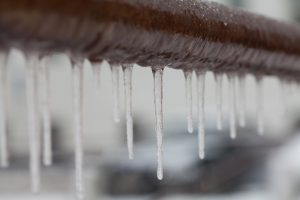 This time of the year is known for chilly temps, falling snow, and—unfortunately—frozen pipes. And this can actually cause a good deal of damage if not addressed properly. This is because as the water in the pipes freezes, it expands and puts pressure on the walls of the pipes, increasing the likelihood of burst pipes.
This time of the year is known for chilly temps, falling snow, and—unfortunately—frozen pipes. And this can actually cause a good deal of damage if not addressed properly. This is because as the water in the pipes freezes, it expands and puts pressure on the walls of the pipes, increasing the likelihood of burst pipes.
Dealing with leaks or ruptured plumbing is very likely the last thing you want to deal with this winter. In order to protect your pipes from such a hassle, there are a few steps you can take. Keep reading to learn more, and then contact our team for reliable Salt Lake City, UT plumbing services, whether you end up with damaged plumbing or you’d just like more information about preventive plumbing care.
First, Open Your Faucets
The pipes that are most vulnerable to freezing are the ones outside your home, naturally. If you have any outdoor faucets, used for sprinklers or hoses, be sure to turn off water flow to these points. Then, open your faucets to drain any water that’s left, and leave them open. You may also consider getting some insulated caps for your hose and faucet openings.
Disconnect Hoses
Disconnect any hoses that you used outside during the summer, before temperatures drop any lower. Ensure that like your outdoor faucets, these are properly drained before you store them for the winter.
Insulate Your Plumbing
There are other pipes you use within your home that are sensitive to freezing temperature, but have to remain in use anyway—in other words, you can’t simply open the faucets and shut off your water supply. This typically includes pipes that are under the sink, in crawlspaces, or in basements.
It order to best protect these pipes from freezing temperatures, the best thing for you to do is invest in some pipe insulating sleeves, when you can get from your nearest hardware store. This helps keep the temperature of the water in your pipes from dropping too low. You can probably accomplish this with towels, if you’d rather save a little money. The most important factor is that you try to keep the pipes as warm and insulated as possible.
Keep Your Cabinets Open
You may be wondering where we’re going with this one—but please bear with us! Plumbing fixtures in your bathrooms as well as your kitchen are often underneath sinks, and run behind the walls that lead outdoors. Since the heat from your heater cannot reach these pipes, it makes them susceptible to freezing.
However, leaving these cabinets open allows that warmth from your furnace or other heating appliance to reach them, making it less likely that they’ll freeze.
What If My Pipes Freeze Anyhow?
It’s true, you might take what you feel are all of the proper precautions, and wind up with frozen pipes anyway. If this occurs, it’s important that you contact our professional plumbers to address the problem.
Trying to thaw pipes on your own can end up causing more harm than good to your plumbing system. You may also unintentionally cause yourself injury, as pipes can burst as they unfreeze due to the pressure build-up in the rest of the pipe.
Contact us today for superior plumbing services and learn why our customers keep saying, “I Love My Design Comfort!”


